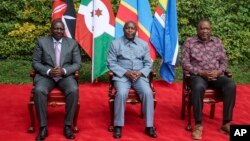Kenya is hosting a third round of talks aimed at bringing peace to the volatile eastern provinces of the Democratic Republic of Congo.
The East African Community regional bloc has convened a meeting in Nairobi to discuss how to solve the political, security and social problems that have plagued the eastern DRC for decades.
This week’s talks are essentially an inter-Congolese dialogue, involving local community leaders, civil society organizations, and some of the armed groups active in eastern Congo.
The EAC says Congo needs to implement political and institutional reforms that will make it conducive to defeat and disarm the armed groups.
Former Kenyan President Uhuru Kenyatta, who is also the bloc’s peace envoy to the DRC, said the Congolese people need to own the peace process and address the real insecurity problems in Ituri, North and South Kivu and two other provinces.
“To also deepen the consultation of communities and armed groups from the concerned areas for the greater inclusivity and greater ownership of the process, including for the first time with the representatives from Maniema and Tanganyika, and identification of root causes of the conflict in the five provinces and finally to evaluate the concrete modalities for the restoration of state authority in each province,” Kenyatta said.
The eastern DRC is engulfed in violence in part because of armed groups competing over the area’s rich mines. Neighboring countries' troops have crossed into Congo, chasing rebel groups that they accuse of trying to destabilize their countries.
Most recently, the Congolese army has been fighting with the rebel group M23, which it accuses of receiving military support from Rwanda, an accusation denied by Kigali.
The M23 agreed to a cease-fire last week during talks in Angola but said they will not withdraw from territories captured from the Congolese army.
The rebel group has blamed the army and some rebel groups for attacking their families and uprooting them from their homes.
Ugandan President Yoweri Museveni, who joined the conference online, said Congo’s problems can be solved but all communities must be involved in the peace process.
“The internal groups of Congo come from the weakening of the state authority in that area for a prolonged period but even this problem can be solved by combining the political method, i.e. dialogue, with military method,” he said. “The peaceful solution should be the outcome of that dialogue but the victim communities and the refugees should also be consulted.”
Kenyan President William Ruto said the region must work towards peace and respect international laws.
"We are here to emphasize the urgent need for dialogue, de-escalation and to encourage and facilitate every actor to intensify their pursuit through the effective engagement of regional and international dispute resolution mechanisms,” he said. “We also encourage regional states to maintain their commitment to existing regional bilateral as well as multilateral understanding."
The DRC said it will hold presidential and parliamentary votes by December 2023 and the electoral commission said it will stick to the deadlines despite the threat of armed groups.




